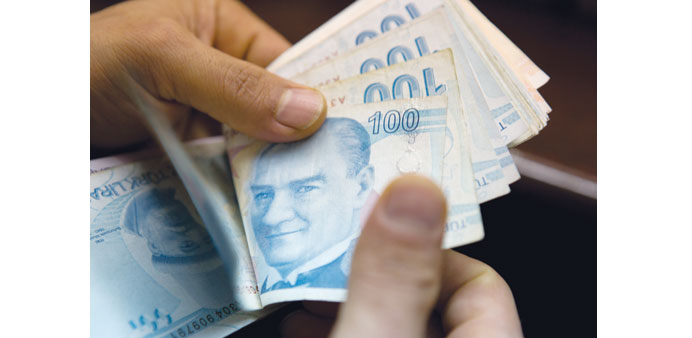Reuters
Istanbul
Turkey has lowered its economic growth forecasts for the next three years and painted a gloomier picture of the outlook for inflation, as political uncertainty and unrest in the largely Kurdish southeast weigh on investor sentiment.
The revision came as investors were also digesting the impact of twin suicide bombings in the capital Ankara on Saturday, which killed up to 128 people in the worst attack of its kind in Turkey.
The lira weakened while stocks fell 0.3%, underperforming emerging markets peers, as the attack raised concern about the security of a November 1 parliamentary election.
“This comes at a difficult time for Turkey,” Tim Ash, senior CEEMEA desk strategist at Nomura, said in a note to clients, but added that many of the risks in Turkey were already priced in, with investors reducing their exposure in recent months.
The government lowered its forecast for growth this year to 3% from 4, and to 4% from 5 for 2016, in an update of its medium-term programme - its economic strategy paper for the next three years - published over the weekend.
The inflation forecast was revised up to 7.6% from 6.3% for this year and up to 6.5% from 5% for next. Official forecasts for exports were also revised down to $143bn from $173bn this year.
“Such a change in the inflation path would suggest a looser monetary policy stance in the upcoming period. This would be considered negative for the currency,” said Erkin Isik, strategist at TEB-BNP Paribas.
Government officials have said the snap election will go ahead in three weeks’ time despite security concerns following the Ankara attack.
President Tayyip Erdogan hopes the AK Party he founded will regain the overall majority it had held since 2002, but lost at June elections. The lira stood at 2.9323 to the dollar, having touched a low of 2.9625 overnight and leaving it around 20% weaker so far this year. The lira has recently clawed back losses from a record low of 3.0750 on September 24.
Lira slides as blasts risk deepening political tension
Bloomberg
Istanbul
Turkey’s lira declined for a second day and bonds fell as bombings in Ankara threatened to ratchet up political tension before elections next month.
The currency weakened as much as 1.8%, trading 0.4% lower at 2.9218 against the dollar at 6:45 pm in Istanbul, after blasts killed at least 97 people at a peace rally on Saturday. The yield on two-year notes rose the most in two weeks.
The Ankara attack was the deadliest in Turkey’s recent history and has heightened the nation’s political and ethnic tensions already exacerbated by the civil war in neighbouring Syria. The lira has plunged 20% this year, the biggest decline after Brazil’s real among 24 emerging-market currencies tracked by Bloomberg, after inconclusive elections in June failed to produce a majority government as security risks escalated at home and abroad.
“The violence leaves Turkey in the throes of deepening domestic unrest and the spill-over from a deteriorating war in bordering Syria,” said Mert Ulker, head of research at Ak Yatirim in Istanbul. “The political polarization, uncertainty over the formation of Turkey’s pending government, and the mounting local and external security challenges will likely keep the Turkish political, geopolitical risk premium elevated.”
The yield on two-year lira notes climbed 12 basis points to 10.84% and is up 282 basis points this year. The cost of protecting against default on Turkish government bonds rose the most in two weeks.
The lira pared earlier losses as investors reassessed whether the currency’s declines this year were overdone given the outlook US interest rates staying lower for longer. Emerging-market assets rallied last week as economic data spurred futures traders to push back bets for the Federal Reserve’s first rate increase since 2006.
“It is very hard to bet against the lira which still looks oversold and gives a lot of carry,” Dmitri Barinov, a fund manager at Union Investment Privatfonds GmbH, said by e-mail. “With the Fed delaying their first hike even further, sentiment towards EM and Turkey in particular, as one of the most vulnerable to hikes, is improving.”
The short- to medium-term outlook “is worrisome,” according to Gulsen Ayaz, a director of institutional equity sales at the Istanbul-based brokerage Deniz Yatirim Menkul Kiymetler AS.
“We may well go into another round of various uncertainties in political outlook from here,” Ayaz said. “Extreme polarisation of the parties once again makes me think, how they will be able to put a coalition government together, and if so, how these leaders will make it work.”

The lira weakened as much as 1.8% at 2.9218 against the dollar yesterday
